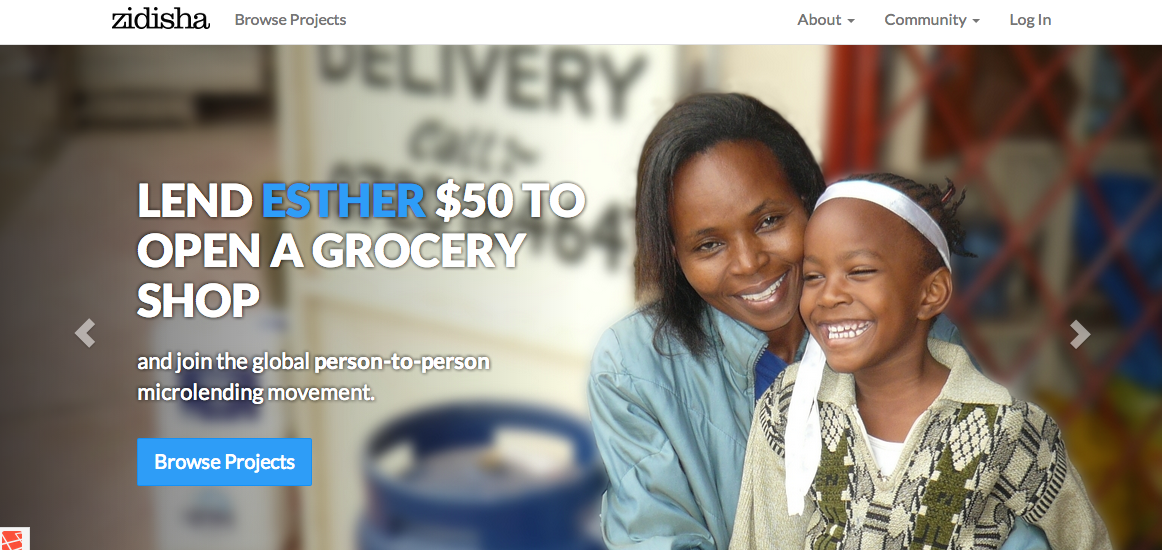By Julia Kurnia, Director
Several technological and political forces have converged, and that has produced a global, Web-enabled playing field… without regard to geography or distance.
– Thomas Friedman, The World Is Flat
Today marks five years since Zidisha’s official founding.
In reality our story goes back a bit further, to 2006. At the time I was living with a fisherman’s family in Senegal, West Africa, helping a small nonprofit organization there raise funds through the popular microfinancing platform Kiva.org. The loan recipients, mostly older rural women who had never used a computer, needed the organization to interact with the Kiva lenders on their behalf. But it was so expensive to hire staff for this purpose that we would have had to charge the women exorbitant interest to cover the administrative cost of the loans. The high staff-to-loan amount ratio is the main reason why the world’s poorest people pay the world’s highest prices for loans: the global average microfinance interest rate is around 40%!
I was in my early twenties at the time, and my friends were the young adults of the fishing village. Unlike previous generations, they had grown up with Facebook and used the internet comfortably. Educated and ambitious, they chafed at the lack of local opportunity. From time to time, one of my friends would disappear, only to turn up weeks later after being intercepted in an overloaded boat on the way to Spain. Traditional microfinance organizations mostly ignored these young people, as they often lacked property that could be seized in the event of loan default, permanent homes where loan officers could find them, and interest in being herded into groups or made to attend donor-prescribed trainings in basic numeracy and hygiene. Convinced that modern online marketplaces such as those that wealthy country residents take for granted could provide greater value at lower cost, I tried to help Senegalese entrepreneurs raise small business loans through Facebook and eBay (the listings were taken down).
I subsequently moved to Kenya, the developing world’s leader in mobile phone-based payments. For months I tried unsuccessfully to convince Kenyan banks to allow Zidisha to transfer direct person-to-person loans through their accounts. There was no precedent for such a lending model, and they were playing it safe. Anyway, the banking experts agreed, the idea was unworkable. People are fundamentally self-serving, they said. Without local loan officers to police repayments and seize borrowers’ assets in the event of default, the borrowers would not repay the loans. Meanwhile, two failed attempts to build the Zidisha website had depleted my savings.
By October 2009, I was back in the US, working at a day job while plowing forward with Zidisha. One of the Kenyan banks had finally agreed to let us open an account, and an attorney who helped pioneer the legalization of peer-to-peer lending in the United States agreed to provide pro bono legal counsel. On October 27, 2009, Zidisha was officially incorporated as a nonprofit organization in the state of Virginia.
When the Zidisha website first launched, it featured just a handful of projects in Kenya and Senegal. The idea that strangers on the other side of the world could be trusted to repay loans of their own accord was too far-fetched to appeal to the general public. Our early loans were funded with the remainder of my savings, with help from family and friends who did not really expect to be repaid. One of our very first entrepreneurs is featured in this early screenshot of our website:
When our first cohort of borrowers proved the naysayers wrong and repaid their loans in full, others slowly began to take interest, and new lenders joined. Even though our lending model was unconventional, Zidisha’s premise that people everywhere are fundamentally the same, and our determination to facilitate personal connections across hitherto impregnable barriers of distance and circumstance, resonated. It was an idea whose time had come. People from all walks of life joined us as volunteers, lenders and borrowers.
Fast-forward five years, and our community has grown to over 15,000 members in 141 countries. Together, we’ve facilitated over 8,000 life-improving loans. Perhaps more importantly, we’ve proven that technology can be used to overcome geographic barriers and that ordinary people in the world’s poorest places can participate successfully in modern online marketplaces without local gatekeepers.
To illustrate what all this means in human terms, I’d like to return to the story of Ndeye Bineta Sarr, whose first loan application in October 2009 is pictured above. At the time Bineta’s gorgeous hand-crafted dresses were in high demand, but her antiquated manually powered sewing machine limited her production to one or two per week. Things began to change when she raised a first loan for an electric sewing machine (pictured below). Subsequent loans were used to purchase an embroidery machine, open a studio, and hire an employee. These investments roughly tripled Bineta’s production capacity, and her dressmaking business now provides a comfortable living for two people. The profits have put quality education in reach for Bineta’s children, nieces and nephews, and the oldest is now attending university.
This kind of impact, multiplied thousands of times across the world, is what our community has built. Advances in technology made Zidisha possible, but what made it a reality is high faith, generosity, and incredibly hard work by our entrepreneurs, lenders, volunteer staff, interns, volunteer mentors, web developers, and countless others. Zidisha is a collective achievement, a broad movement, capable of overcoming hardened prejudices and spanning vast barriers of distance and circumstance.
We’ve spent the last five years tearing down the wall that has separated people on either side of the international wealth divide for too much of history. We’ve shown that the fundamental human right to grow and connect and build a better life need no longer be circumscribed by one’s geographic location. And we’re just getting started.






